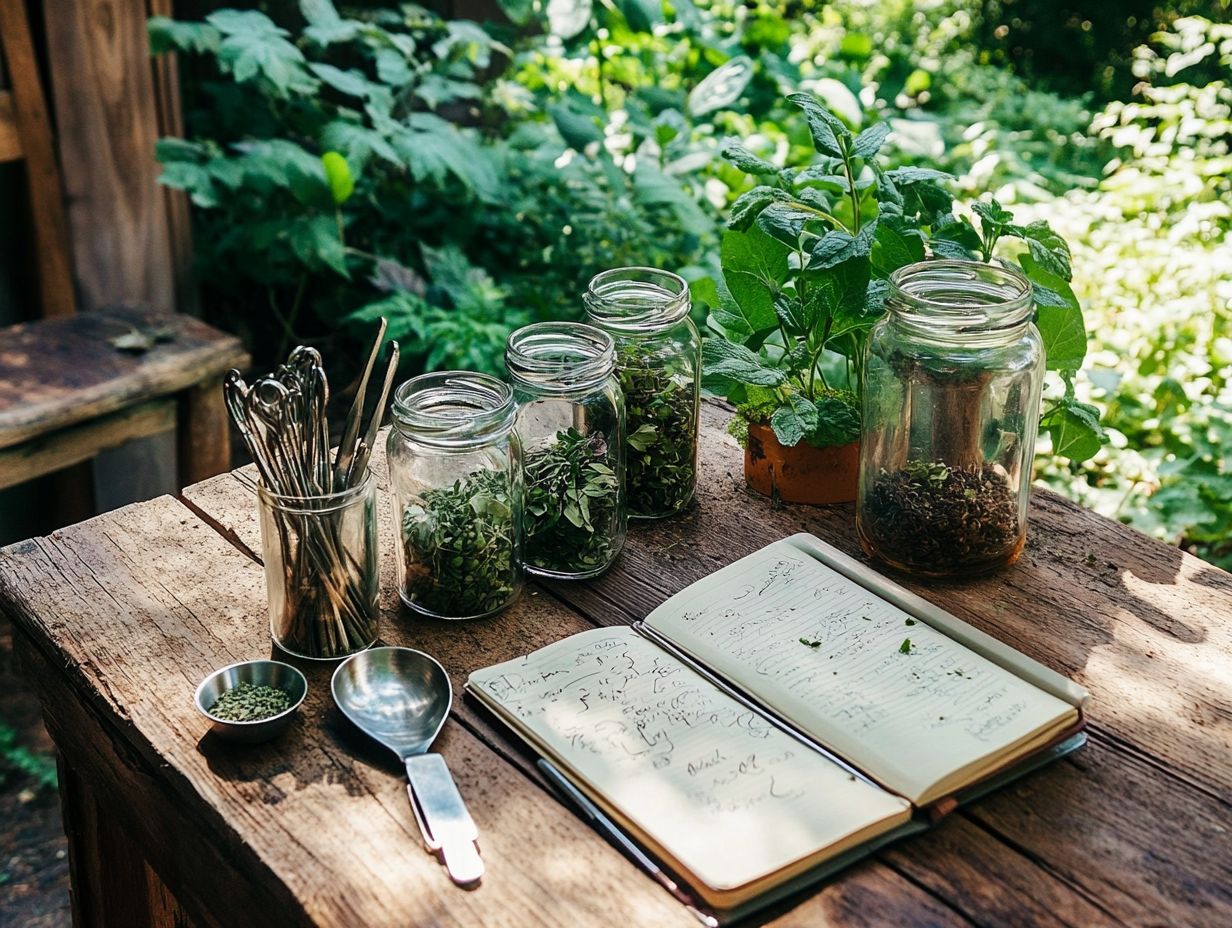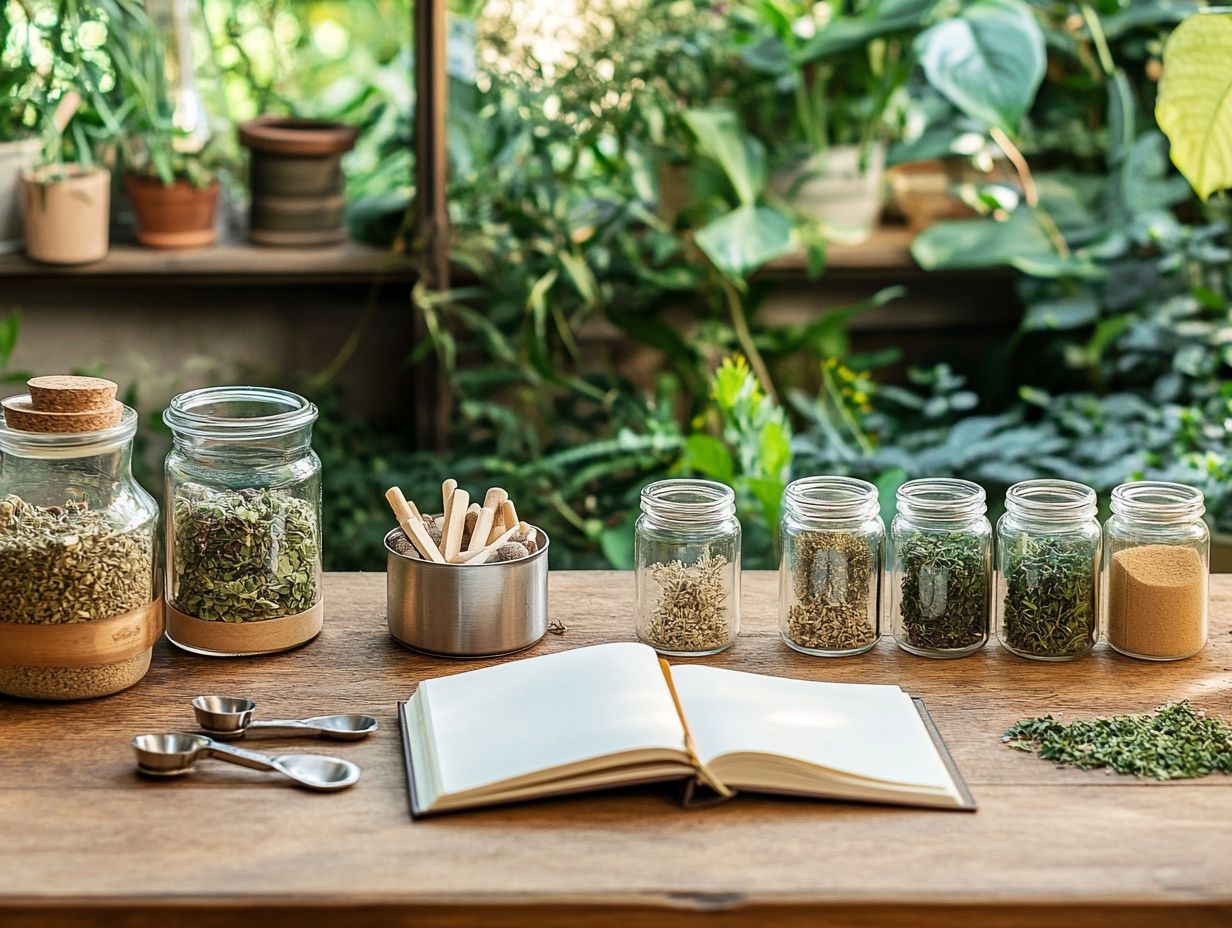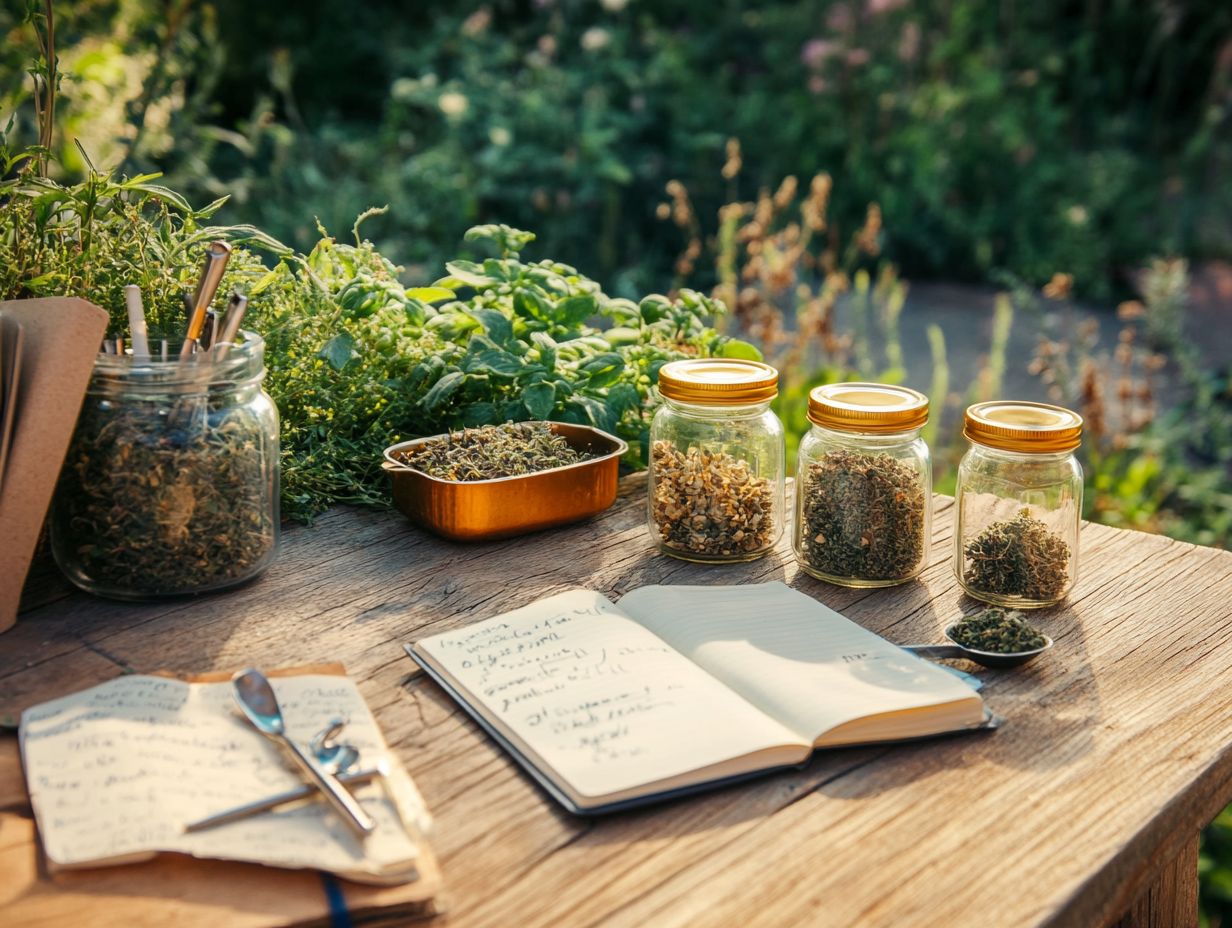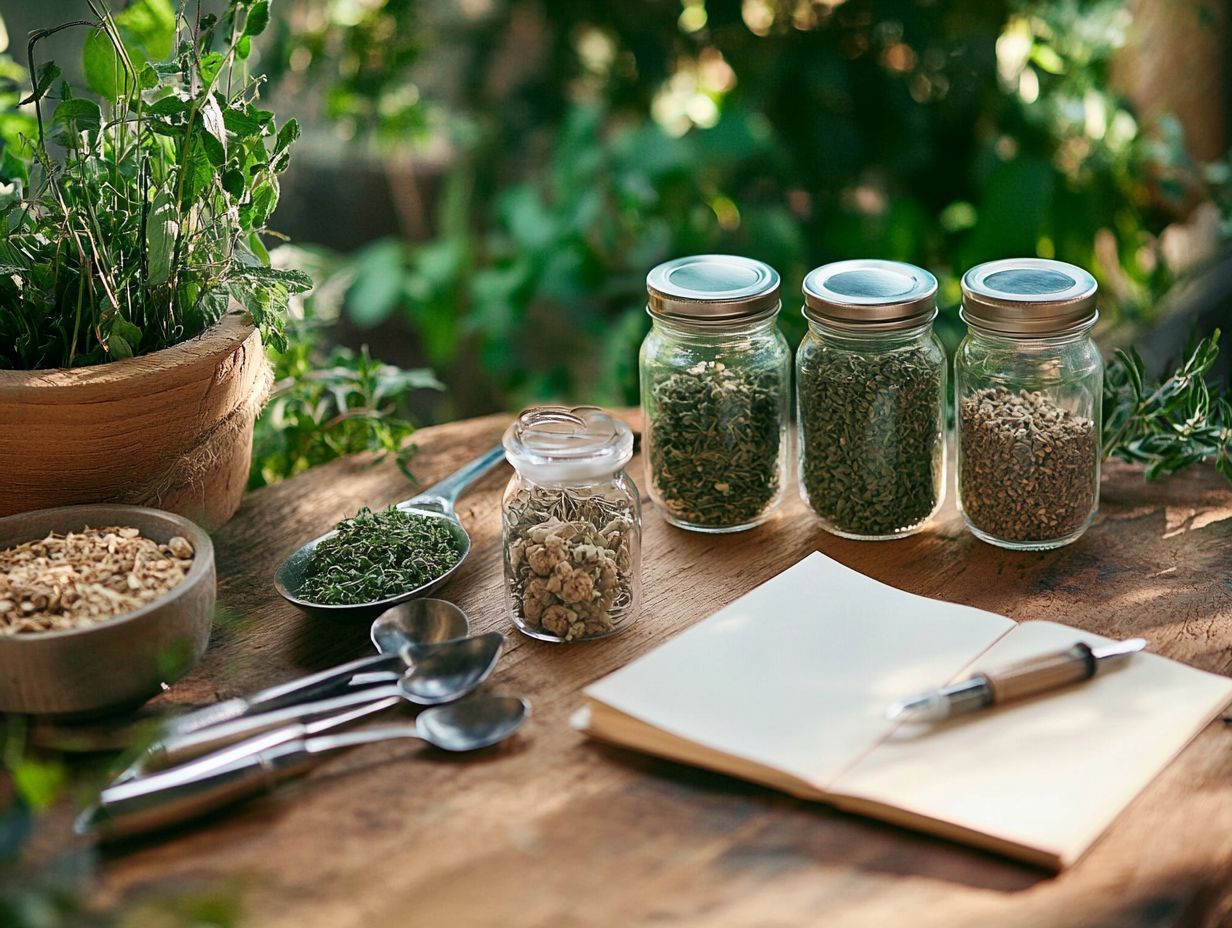Understanding Cautionary Measures with Herbal Dosage
Herbal remedies have surged in popularity as natural alternatives for a range of health concerns. Understanding herbal dosage is crucial for harnessing their full potential safely.
This guide delves into the importance of exercising caution with herbal products, shedding light on potential risks and side effects you should be aware of. It examines individual factors that can influence dosage, provides clear guidelines for safe usage, and offers tailored recommendations for specific conditions.
Whether you consider yourself a seasoned herbalist or a curious newcomer, this guide is designed to help you navigate the complexities of herbal dosage with confidence and responsibility.
Contents
- Key Takeaways:
- Why You Should Be Cautious with Herbal Dosage
- Factors Affecting Herbal Dosage
- Guidelines for Safe Herbal Dosage
- Herbal Dosage for Specific Conditions
- Frequently Asked Questions
- What is the importance of understanding cautionary measures with herbal dosage?
- How can I determine the appropriate herbal dosage for my needs?
- What are some common cautionary measures to keep in mind when taking herbal remedies?
- Can I mix different herbal remedies together and still follow cautionary measures?
- What should I do if I experience any side effects from an herbal remedy?
- Are there any specific groups of people who should take extra caution when using herbal remedies?
Key Takeaways:
- Always exercise caution when using herbal remedies; they can have risks and side effects.
- Individual factors and interactions can affect the safety and effectiveness of herbal dosages.
- Follow recommended dosages for safe use, especially for specific conditions.

What is Herbal Dosage?
Herbal dosage encompasses the precise amounts of herbal supplements like Echinacea, St. John’s Wort, and garlic that you should consume to achieve the desired medicinal benefits while minimizing health risks. In the realm of alternative medicine, getting the herbal dosage right is essential for ensuring both the effectiveness and safety of these plant-based remedies, which can help address a variety of health conditions such as anxiety and arthritis. These choices are often grounded in traditional medicine practices and bolstered by clinical trials.
When determining the right dosage, consider factors like your age, weight, existing health conditions, and the specific purpose for which you’re using the herbal remedy. It s equally important to seek advice from qualified health professionals who can evaluate your individual health needs and potential interactions with other medications.
Generally, best practices suggest starting with a lower dosage and gradually increasing it as needed while keeping an eye out for any adverse effects. For example, if you’re looking to ease anxiety, you might begin with a smaller dose of St. John’s Wort and adjust based on how effective it is for you and your tolerance levels. It’s particularly important for pregnant women to refer to herbal dosage guidelines to ensure that herbal medicine remains a safe and effective avenue for enhancing your overall well-being.
Why You Should Be Cautious with Herbal Dosage
Be careful when choosing your herbal dosage, as potential health risks and side effects can stem from the self-medication practices commonly adopted by users of herbal products.
The inconsistent regulation of herbal supplements by the FDA means that you might unknowingly use products that could interfere with your health or prescribed medications, ultimately jeopardizing your patient safety.
Potential Risks and Side Effects
Herbal remedies might seem like safe alternatives to conventional medicine, but they can carry risks and side effects that you need to keep in mind, especially if you’re considering using them without the guidance of qualified health professionals. Clinical trials have shown that certain herbal supplements, like black cohosh and valerian, can lead to adverse reactions or interact negatively with other medications. This highlights the importance of understanding the pharmacological effects the ways these substances work in the body of these natural compounds.
Herbs such as St. John’s Wort and ginkgo biloba have been associated with gastrointestinal issues and increased bleeding risks, emphasizing the necessity for thorough awareness before you dive in. It’s easy to overlook the fact that even the most popular supplements may not be universally safe; their potency and purity can vary widely.
Before starting any herbal regimen, talk to your healthcare provider. They can help you understand what s safe for you. While exploring the potential benefits of herbal supplements, it’s crucial to remain mindful of their possible side effects, paving the way for a more informed and balanced approach to natural health.
Factors Affecting Herbal Dosage

Several individual factors influence your herbal dosage, such as age, sex, and health conditions. Specific interactions with other dietary supplements or medications also play a role. This complexity necessitates a personalized approach to herbal medicine.
Understanding these factors is essential for maximizing the health benefits of herbal supplements like ginger and milk thistle. These benefits can vary significantly from person to person and ultimately impact treatment outcomes.
Individual Factors and Interactions
Individual factors such as your metabolism, existing health conditions, and unique genetic makeup play a crucial role in how herbal products like Echinacea and garlic interact with your body. This makes a personalized dosage essential for achieving optimal health outcomes.
By understanding these interactions, you can ensure your safety while effectively utilizing herbal remedies for various health conditions. For instance, if you have a slower metabolism, you may experience prolonged effects from herbal supplements.
This might make it necessary to use lower dosages to avoid any adverse reactions. Conversely, if your metabolism is faster, you might need larger doses to achieve the same effectiveness, as your body processes these compounds more quickly.
Certain health conditions can also affect how your body absorbs and eliminates herbs, further complicating dosage adjustments. For example, conditions like liver disease or diabetes can influence absorption rates.
By taking these variances into account, practitioners can customize herbal treatments. This ensures that the selected remedies resonate perfectly with your physiological and metabolic context, ultimately enhancing the therapeutic outcome.
Guidelines for Safe Herbal Dosage
Establishing guidelines for safe herbal dosages is essential for maximizing the effectiveness of herbal medicine while reducing potential health risks. It is vital to consult health professionals for personalized recommendations.
By familiarizing yourself with the recommended dosages for various herbal supplements, such as turmeric and ginkgo biloba, you empower yourself to make informed decisions that align seamlessly with your health goals and understanding of plant-based products. You can learn more about how to measure herbal dosages accurately to ensure safety and effectiveness.
Recommended Dosages and Precautions
Recommended dosages for herbal supplements like valerian and turmeric can vary significantly based on various factors, including age and specific health conditions. This variability necessitates clear precautions for safe use.
Knowing these dosages can empower you to use them safely and effectively! Each herbal supplement typically has its own set of recommendations, often detailed on product labels.
The guidance of a healthcare professional can be invaluable. For example, valerian, which many people use for sleep disorders, usually falls within a range of 300 to 600 mg in extract form, taken before bedtime.
Turmeric, celebrated for its anti-inflammatory properties, typically suggests a daily intake of around 500 to 2,000 mg of curcumin, depending on the formulation.
It’s also vital to stay vigilant for possible interactions with other medications, such as blood thinners or certain anti-inflammatories, as well as with other dietary supplements. To ensure safety, consider the 5 essential tips for safe herbal use. Therefore, it’s wise to conduct thorough research and consult with healthcare providers before embarking on any new supplement regimen.
Herbal Dosage for Specific Conditions

When considering herbal dosage tailored for specific conditions like anxiety or menopause, you re tapping into a vital aspect of alternative medicine. This approach offers a holistic path to health, utilizing remedies such as St. John s Wort and black cohosh.
By understanding how to effectively apply these herbal dosages for various health concerns, including anxiety and cardiovascular conditions, you can maximize their therapeutic benefits while minimizing any potential risks.
Act now to discover your perfect herbal blend and consult with a healthcare professional to tailor your approach!
Unlocking the Power of Herbal Remedies: Dosage Tips and Uses
Herbal supplements are commonly used to tackle various health conditions, such as anxiety, arthritis, and cardiovascular issues. Recommended dosages can vary significantly depending on the specific supplements you choose, like garlic or ginger. It s crucial to understand how much to take for these herbal products to ensure both their effectiveness and safety!
Take garlic, for instance. It s widely acclaimed for its potential to lower blood pressure and enhance heart health. Typically, it s taken in doses of 600 to 1,200 mg per day in supplement form.
Ginger, on the other hand, is a go-to for its anti-inflammatory properties, especially for managing arthritis pain. A usual dosage ranges from 1 to 3 grams daily.
Don t overlook ashwagandha, a popular choice for stress relief, generally recommended at doses of 300 to 600 mg per day. Each of these herbs is backed by scientific research, adding to their credibility in holistic health practices.
By ensuring proper dosage, you maximize their benefits and help minimize any potential side effects.
Frequently Asked Questions
What is the importance of understanding cautionary measures with herbal dosage?
Understanding cautionary measures with herbal dosage is crucial for ensuring your safety and avoiding potential side effects. Herbal remedies can affect other medicines and have varying effects on different individuals, making it important to proceed with caution.
How can I determine the appropriate herbal dosage for my needs?

The best way to determine the appropriate herbal dosage is by consulting a trained herbalist or healthcare professional. They can evaluate your needs and recommend the proper dosage based on your health history and concerns.
What are some common cautionary measures to keep in mind when taking herbal remedies?
- Start with a small dose and gradually increase it.
- Monitor for any adverse reactions.
- Avoid interactions with other medications.
- Follow the recommended dosage and do not exceed it.
Can I mix different herbal remedies together and still follow cautionary measures?
While it s generally safe to mix different herbs, it s important to understand potential interactions and follow cautionary measures for each individual herb. It s always best to consult a healthcare professional before combining different remedies.
What should I do if I experience any side effects from an herbal remedy?
If you experience side effects such as nausea, headaches, or allergic reactions from an herbal remedy, stop taking it immediately and consult a healthcare professional. They can help determine the cause and recommend alternative remedies.
Are there any specific groups of people who should take extra caution when using herbal remedies?
Yes! Pregnant or breastfeeding women, children, and individuals with certain medical conditions should take extra caution when using herbal remedies. It s important to consult a healthcare professional before starting any new herbal regimen in these cases.
Ready to explore herbal remedies? Talk to your healthcare provider today!




